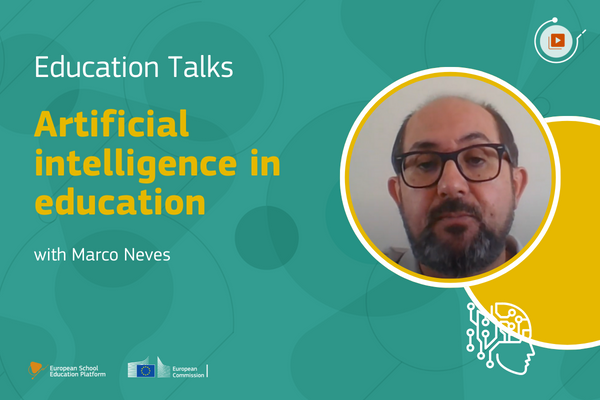Education Talks: Artificial intelligence in education

My name is Marco Neves, I am from Portugal, I'm an Informatics teacher and I've been a consultant in the field of Digital Education for the last years.
Artificial intelligence in education
We have four different subtopics. One is about AI to support teaching and here we are mainly making a reference to the tools and the platform that can support the teacher in terms of evaluation, assessment and also monitoring the students or even facilitating all the work of the teachers. Another subtopic in the learning with AI is about AI for teaching students and we have different kinds of platforms here that can be integrated in the teaching and learning process. One of them is, for example, the intelligent or the dialogue-based tutoring systems. This is a particular field we are focused more in terms of the student learning, but we also have the dialogue-based tutoring systems, the exploratory learning environment, so there are different types of tools and platforms here that can be used. And the last subtopic is about AI to support diagnostic and system-wide planning, and here we have, for example, learning analytics or even tools that can help students with different learning difficulties, such as dyslexia.
Artificial intelligence in the classroom
We see different kinds of tools that can be used for example, to support the students to learn different kinds of languages and we have apps that can easily be used by teachers and also by students. We can also see different tools in the field of math, for example, that can be very useful in terms of supporting the learning process of the students. And we are starting also to see different tools that can be very useful for teachers in terms of assessment.
Advances in artificial intelligence
Some examples could be AI tools for collaborative learning, continuous assessment. For example, we have for the students some kind of AI learning companions to interact with and have some kind of support and feedback not only focused on the traditional assessment but also to be able to inform teachers and students about other skills, such as soft skills.
Ethical concerns and challenges
We have to be aware of the ethical obligations, for example, of private organisations, i.e., the developers of AI in education. Also, in terms of the public authorities, such as schools and universities that are involved in the AI education research. But we also have to be aware of the ethical implications of not being able to easily know how these deep decisions are made by these AI algorithms nowadays, mainly in terms of neural networks. And also, what are the ethical consequences of encouraging students to work autonomously with this AI supported software?
Supporting teachers
It's very important that we create opportunities for the teachers to know what AI is, how AI is impacting our lives, so they can bring this subject to the classroom, and take a look at the subjects they are teaching, and consider how they are being impacted by AI, to make students be aware of AI.
Additional information
-
Education type:School Education
-
Target audience:Head Teacher / PrincipalICT CoordinatorParent / GuardianStudent TeacherTeacherTeacher Educator
